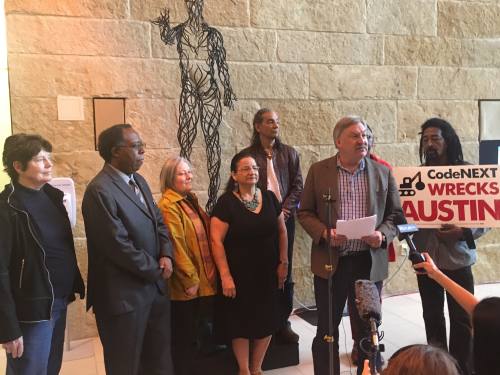Austin City Council will vote Thursday whether to support leaving the fate of a five-year, $8.5 million land development code rewrite to voters.
No matter Thursday’s outcome, city officials and people close to the issue expect the ultimate decision to come from the courts.
“There will be legal action regardless of what happens [Thursday],” District 6 Council Member Jimmy Flannigan said.
Voters petition for a say
In March, the city received a petition with what would be 26,000 valid signatures from Austinites demanding the city pass an ordinance to give residents voting power on any comprehensive rewrite of the land development code.
The attempt at a citizen-initiated ordinance was spurred by CodeNEXT—Austin’s attempt to rewrite its land development code. The project has inspired a years-long and heated political debate between those who encourage adding building density and those who support preserving existing neighborhood character.
After hearing third-party legal advice that state statute says zoning laws are outside the scope of citizen-initiated ordinances and the city has no authority to act on the petition, City Council voted 6-4 in April against adopting the petitioned ordinance.
However, since there was a valid petition and city council did not adopt the requested ordinance, law then requires citizens to decide on the ordinance through a citywide referendum. In this case, it would basically be a referendum on whether to hold a referendum.
Thursday’s forthcoming council vote will decide whether to begin the process of placing the question on the November ballot. Regardless of the outcome, the losing side is expected to file a lawsuit against the decision.
Legal action is imminent
Fred Lewis is a local attorney who heads Community Not Commodity, a group that helped support the petition. Lewis declined to make a prediction on Thursday’s vote but guaranteed legal action if council votes the ballot process down.
“[If we lose] we’re going to sue the city on behalf of the people who signed the petition,” said Lewis, who expressed confidence in the outcome. “In a democracy, the courts avoid interfering with an election if at all possible. It has to be an extraordinary circumstance to interfere … [here] there are no extraordinary circumstances.”
Lewis alluded to the 1992 decision on the Save Our Springs ordinance to preserve the area around Barton Springs from development. City Council voted against adopting the citizen-initiated ordinance, and later against putting the question on the ballot, citing the ordinance’s relation to zoning law. The case eventually went to the Texas Supreme Court, which sided with holding an election. The ordinance later passed with a 64 percent majority.
Flannigan said he did not expect the majority of City Council to vote in favor of putting the question on the ballot, but that a lawsuit would happen “regardless.”
Flannigan, along with Mayor Steve Adler and council members Delia Garza, Ann Kitchen, Pio Renteria and Greg Casar, voted against adopting the ordinance in April.
District 1 Council Member Ora Houston on Tuesday disagreed with Flannigan and said she thought it would pass. Houston has scheduled a press conference at 9 a.m. Thursday before City Council takes up the issue at its regular meeting.
Amy Smith, spokesperson for District 7 Council Member Leslie Pool's office, said council has not yet had the discussion about what the legal process would be in the event that the ordinance does pass on Thursday.
Flannigan said no matter the outcome, the best interest of the city is to swiftly resolve the issue.
“Pretty fair to say that no matter what side of the argument you fall on, we want this to be resolved as quickly as possible,” Flannigan said. “If we’re wrong [and the question should go on the ballot] then let’s get that figured out so it can be on the ballot in time [for November.]”
